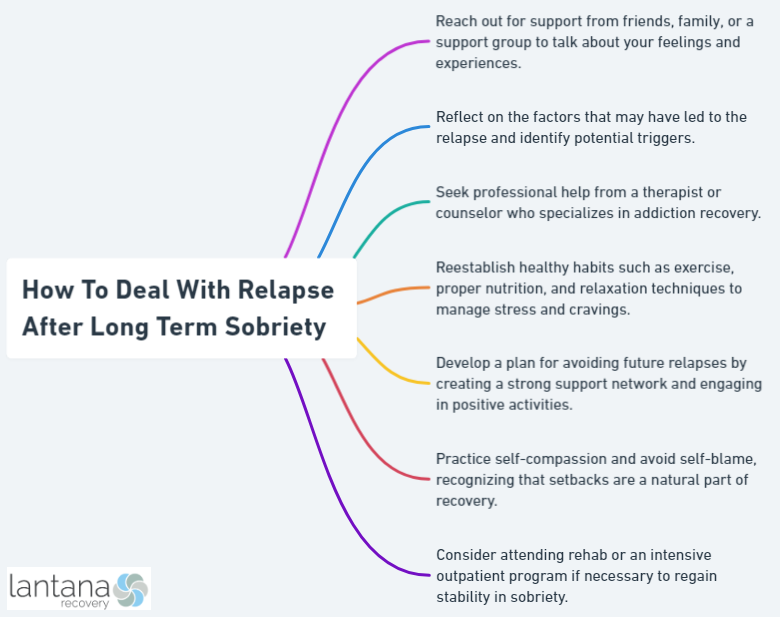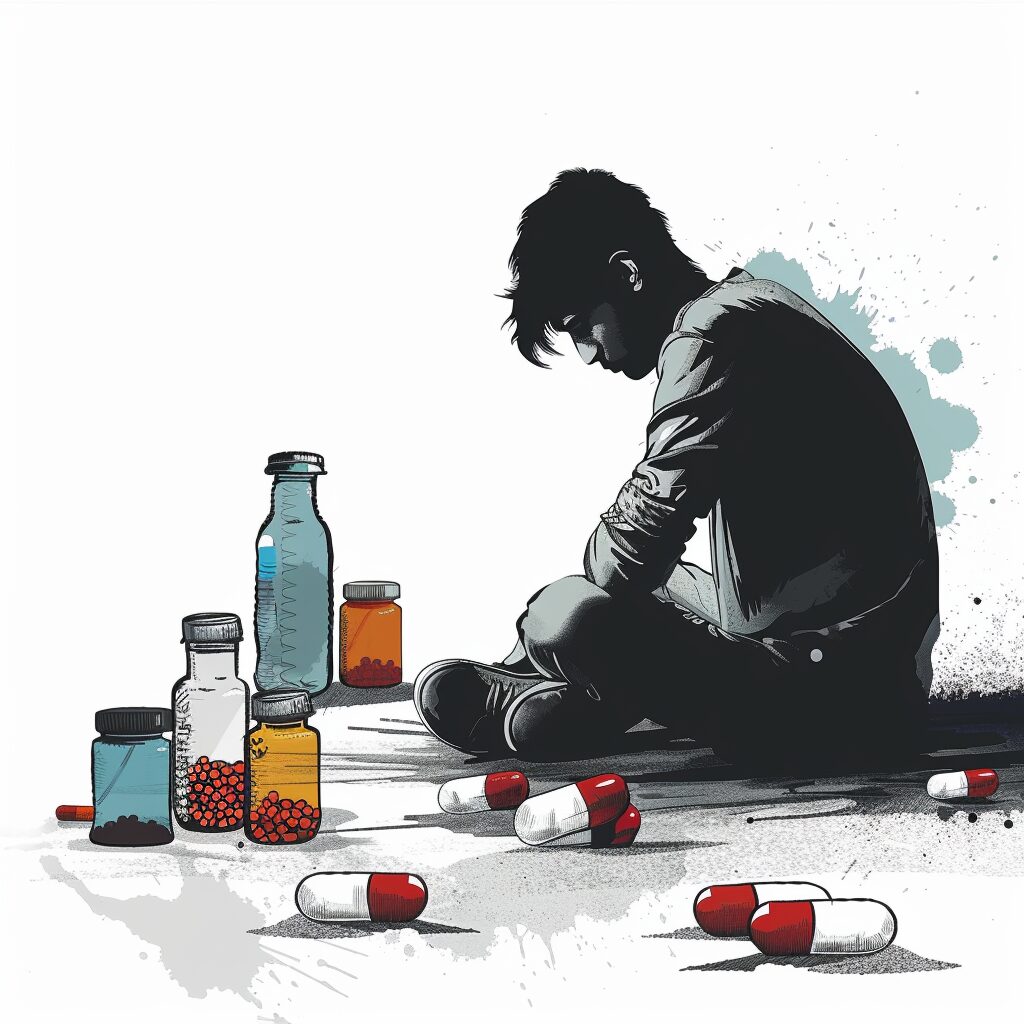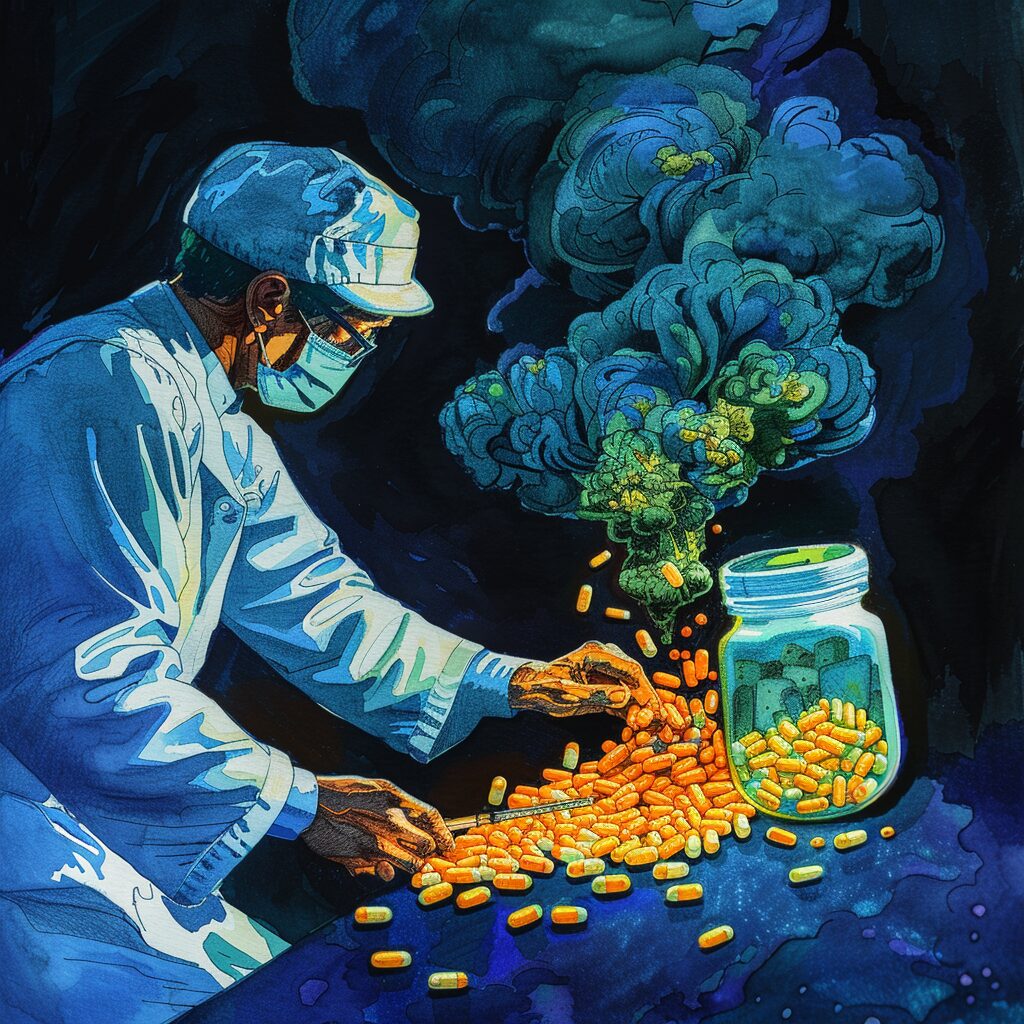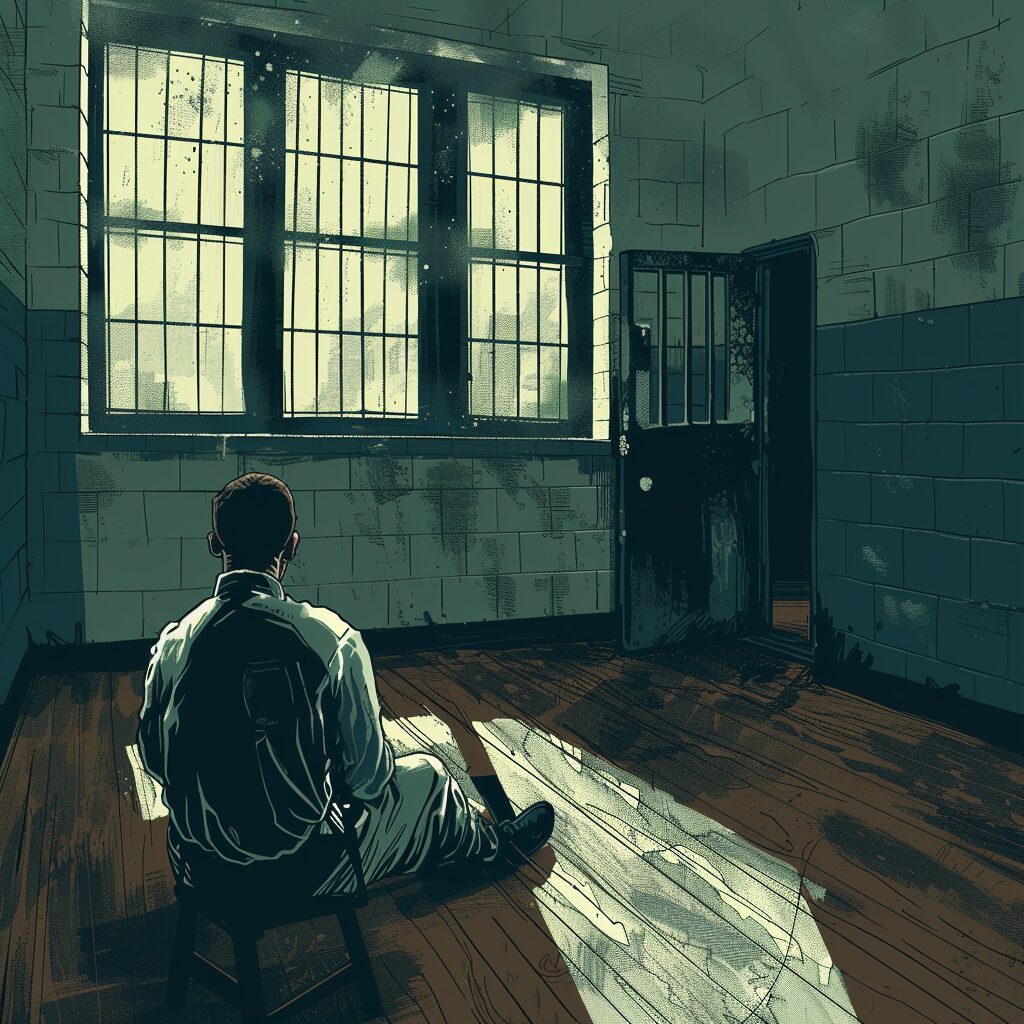Key takeaways:
- Relapse is a constant threat to sobriety, even after years of being sober.
- Reasons for relapse after long-term sobriety includes not participating in sober fellowship, facing stressful situations, inadequate coping mechanisms, co-occurring mental health disorders, occasional drinking, fading memories of the battle with addiction, bad company, and not understanding that recovery doesn’t mean being cured.
- Managing triggers, having a support network, managing stress, treating mental health issues, and seeking therapy are ways to avoid and deal with relapse.
- The relapse rate for recovering alcoholics is 1 or 2 times in the first year of sobriety, and relapse is a common part of the recovery process.
- Recovery from a relapse varies for each individual, and seeking professional support is essential to overcome it.
Whether a person is 20 days sober or 20 years, relapse is a constant threat to sobriety. And not acknowledging this fact leads to a dangerous denial, because knowing it could come back anytime makes a person aware and work hard to remain sober. Under familiar stressful circumstances, people are left vulnerable to relapse no matter how many AA meetings they have logged or how strategically they have managed their sobriety for years.
Why do people relapse after long-term sobriety?
The reason it’s important to acknowledge the constant threat that relapse poses even after years of sobriety, is that there are many things that lead a person down the road to relapse. They could be faced with the situation that caused them to get addicted in the first place. Here are some of the reasons a person might fall back towards alcohol and drug addiction after living a sober life for years:
1. Not Participating In Sober Fellowship
It’s important to keep attending sober programs and support group meetings even after years of sobriety. They are a great source of support to help remain sober and giving it up might affect a person’s resolve to remain sober. Most sober programs keep a check on a person to make sure they’re not struggling and help them out of situations that might lead towards a relapse. Cutting off such programs is a major cause of relapse.

2. Stressful Situations
A lot of people get addicted to drugs and alcohol in the first place because of facing stressful situations in life. It is like a coping mechanism for them. And later in life if a person faces such a familiar stressful situation once again, they could relapse. Situations like abuse, mental stress, financial stress, death of a loved one, etc could make it difficult for a person to stay sober and ruin the efforts they put into their long-term recovery. Stress increases the risk of a lower mood and anxiety causing alcohol cravings.
Experts say that due to these differences, neuronic signals may not work as well as normal brain reward signals that stimulate certain physiological processes such as stress and mood. This will trigger the same brain circuitry triggered in your previous memory when you have sought to drink. This may lead to cravings and this could have the potential to trigger a relapse, doctors said. When something triggers a craving it results in an addictive behavior and alcohol rewards systemic recovery. In such situations having the support of family and friends is really important because it will help them manage stress without turning towards addiction.
3. Inadequate Coping Mechanisms
As already discussed a person might face familiar stressful situations that led them to addiction in the first place. So it is important to have coping mechanisms that are not alcohol and substance abuse, in order for a person to successfully deal with a stressful situation without a relapse. It could be a support program, a hobby, a fitness program or anything that a person feels comfortable doing that helps them relax. For instance according to a research by Carla J Rash on Substance Abuse Treatment, the use of homeless and transitional housing (e.g., recovery homes) programs can be associated with success in substance abuse treatment. Lacking such healthy coping strategies might lead a person to the road of relapse and alcohol and drug addiction once again.
4. Co-Occurring Mental Health Disorders
Unstable mental health and underlying mental health issues often lead to a mental relapse and especially in a recovering alcoholic, it makes it difficult for them to stay sober. The persistence of untreated conditions like depression, anxiety, restlessness, etc can cause a person to turn towards drugs and alcohol to manage their conditions, and hence a relapse occurs according to a psychiatry research titled “Evaluating depression in alcoholics” by Charles A Dakis. Emotional stress is the deed cause of relapse in a recovering alcoholic and in people with long-term sobriety or active addiction. It is because emotional pain leaves a person vulnerable.
5. Occasional Drinking
After a long period of staying sober, a person might come to believe that they have been sober for a very long time they can handle a little bit of occasional drinking here and there. But what they don’t understand is that, unlike some other people in their circle, they have battled with addiction, and even occasionally drinking could start giving them alcohol dependency because alcohol abuse is a lifelong condition and it cannot completely go away. If a person does not want their recovery journey and the numerous alcohol abuse treatment programs they had to go through, to go down the drain, they have to avoid even occasional drinking.
6. Memory Fades
Just like casual drinking, after years of maintaining long-term sobriety, a person’s memories of their battle with addiction may start to fade or sink into the back of their mind, which might weaken their resolve to stay sober. This can lead a person to believe that they can now drink occasionally and they might forget their alcohol dependency. This is why it is important that you stay sober and enroll in sober programs that keep reminding you of your struggles and your journey toward a healthy and sober life. Remembering your recovery process maintains your resolve to stay sober.
7. Bad Company
Another leading cause of addiction in the first place, and relapse after long-term sobriety is bad company. If an adult shares in the company of habitable drinkers, they might encourage the person to have one drink here and there. If a person works in such an environment where alcohol is common it could give them cravings even if they have been sober for a long time. Family members and close friends should look for the warning signs of harmful company and help avoid the risk of relapse.
8. Recovering Doesn’t Mean Being Cured
Just because you’ve effectively avoided drinking and using only a drink does not make you cure. If you relapse after years of long-term sobriety you might have a hard time starting over. A sober life is far better than a life in passive compulsion. Recovering from a lifelong addiction can cost you a life too. Remember it’s much easier to stay sober than get sober. Your recoverability journey is ongoing which doesn’t make any sense. You’re doing fine. But it’s not always easy when saying ‘yes’.
Alcohol Relapse Statistics
In spite of several decades of research and treatment efforts, the rate of relapse to substance abuse remains high. More than 30% of people who quit alcohol relapse within one year of their first year. However, lapse rates are decreasing over time. In one study the study found that 21.4% of people who recovered quickly relapsed. Only 10.6% relapsed three years out of five and only 10.3% if there had been a five-year relapse. Over 70% of people suffer from an alcoholic relapse in one year, according to a study on long-term relapse prevention strategies by Richard Appiah.
You can be living with addiction if you are struggling with a drug problem or alcohol addiction. In other words, alcoholism can not be cured but is largely managed. Sometimes professional treatment like Lantana is required for individuals to become sober. People therefore must keep sobriety over the years through participation in after-treatment facilities and support programs, such as the 12-step program. Even those who work hard can slip, lapse, and relapse in an alcohol addiction recovery process. The recovery journey takes work and even more complicated individuals and communities may need slip-and-recovery slips and lapses during the recovery process.
What is a relapse?
A relapse refers to the deterioration or recurrence of a condition or behavior after a period of improvement or recovery. This term is commonly used in the context of health and mental health, encompassing a range of situations such as substance abuse, mental disorders, and physical illnesses. A relapse signifies the return of symptoms or behaviors that were previously under control, often due to a variety of factors such as stress, triggers, lack of coping strategies, or underlying vulnerabilities. It’s important to recognize that relapses are a natural part of many recovery journeys and should not be regarded as failures. Instead, they can serve as opportunities for learning, growth, and adjustment of strategies to better manage and sustain long-term progress.
How To Avoid Relapse
After winning that difficult battle for sobriety, it can be devastating that it won’t always last forever. There are some situations when there’s still a chance of you relapsing just after cleaning the house. This article goes into detail about what can be done for relapse while cleaning. Sometimes it is seen as a part of the journey that can help recover from a serious medical injury after having successfully recovered.
A relapse following prolonged sobriety can overwhelm the body with lethal toxins and cause drowsiness. Alcoholics also have a large rate of suicide with depression accompanying a sense of failure and despair in those who relapse. It is common to feel regret when an individual has relapsed after the first period and that does not need to discourage that individual from continuing the necessary recovery activities that will have saved their life. Seek support from a loved one and do whatever is necessary to reclaim sobriety the author said. This is imperative if individuals who had relapsed must return either to treatment or to sober living situations.
Here is how you can avoid a relapse in the first place:
1. Manage Triggers
Triggers are things that lead a person to addiction and made them dependent on harmful substances for dealing with stressful situations. A trigger after addiction treatment and long-term sobriety can be something that reminds them of their addictive behavior and the reasons that lead them towards addiction. It is important to manage those struggles by having a stronger coping mechanism that will help you in case you encounter a trigger. Managing the things that trigger addiction will help maintain long-term sobriety.
2. Have A Support Network
Having a support network is important for dealing with addiction and maintaining a sober life. Try to surround yourself with people who are sober and supportive and invest your time in people who encourage healthy behavior and lifestyle. Avoid people that occasional drinkers and might Trigger your addiction. It is also important to keep participating in the 12-step program and log in to AA meetings. People who have battled with addiction can give each other support and motivation by sharing their struggles and reminding them of the reasons why they started this journey.
3. Manage Stress
Managing stress is important because situations that give you emotional and mental stress can trigger addiction and cause a relapse. You can manage stress by learning healthy coping mechanisms and techniques with us, for example, regular exercise, a healthy diet, meditation, picking up new hobbies, and doing things that are meaningful and healthy for your mind. When you have other stress managing mechanisms it is unlikely that you will turn towards alcohol or substance abuse.
4. Volunteer And Mentor
You can volunteer to be a mentor for someone who is currently living with addiction or has recently recovered. Helping someone on their journey towards a bright he will help you keep motivated and remind them of the reason why you started this journey in the first place.
And the longer you can refrain from drinking, the better chance you have of success. The key is understanding your alcohol relapse statistics and knowing your triggers. As with everything, the less you have to work on overcoming depression the more effectively you’re prepared. If you feel that your anxiety may wane you to return, you should make your triggers aware and try new strategies. Don’t be afraid of a relapse, it’s a part of your journey and does not mean that you have failed in the battle with addiction.
People who start taking sobriety often find that they stop right where they began and never stop. You’re going to start wondering why go to meetings when you’ve learned how to live on terms. If you are abstinent over longer terms, your body’s ability to take large amounts of alcohol will be lower in terms of handling and potentially more difficult to manage. It’s dangerous. After all, it’s been years since you stopped drinking it’s not hard to stop it.
What To Do After A Relapse
How can you handle your relapse? The sooner you take any corrective actions to deal with a relapse the more unlikely it will be to return. Most people who enter rehab from drug abuse a second and sometimes a third time gain additional support. Remember that there’s never a relapse so massive for recovering. Take measures to help your loved ones and stop using drugs again. Do something to care for someone who has experienced a relapse in the past. Here are some of the things you can do if you or someone you know has relapsed or is showing symptoms of a future relapse:
1. Remain Positive And Hopeful
This is the most important thing while dealing with the relapse. You have to remember that it is not unusual and it is not the end of your journey. It’s just a minor setback and you can overcome it with positive thinking and sheer determination.
2. Seek Therapy
If you had discontinued therapy prior to a relapse, it may be time to resume it. Learning to manage your triggers is important and even if you previously took therapy, some extra support during this time might be a good idea. A professional might show you a different and more effective approach you can take to manage your triggers and addictive behaviors. There are programs available that are especially for relapse situations and provide extra support. Don’t feel shy to seek therapy or any form of support you might need because your health is the most important and it should come first.

3. Cognitive Behavioral Therapy
Behavioral therapies are a really effective approach while dealing with addiction and it will help you understand what exactly triggered the relapse. It can help you identify your unhealthy behavioral patterns and thought processes and deal with them.
4. Attend the 12-Step Program
Attend the 12-step program or a group support program with Lantana on a daily basis or at least regularly. You can connect with people who have previously relapsed and learn to deal with this situation. They can also give you pointers on how to avoid this in the future and share what worked for them. Support is the backbone to maintain sobriety.
5. Family Therapy Sessions
The support from friends and family members is crucial during this difficult time and your loved ones can extend their support to you by attending family therapy sessions and understanding how they can help you.

6. Treat Mental Health Issues
Underlying mental health conditions are also a root cause of addiction and relapse. There might be some conditions that were not previously present but are now contributing to your relapse. Make sure that you seek proper treatment for your mental health problems in order to maintain a sober and healthy life.
Not Understanding The Disease
Addiction is a developmental disorder that means a person is not actually addicted and alcoholic at birth. Addiction starts with substances that chemically and structurally change the brain making the brain more susceptible to the risks for the development of the disease. Genetics mental illness, childhood trauma, social environment, and early use. All five can actually create brain changes or influence any underlying change. If one doesn’t treat one’s mental illness during their addiction treatment might be a trigger to addiction that was initially found so soothing. 21st-century brain and addiction-related science now prove that there are a variety of ways to get your brain functions back and treat addiction.
How many times does the average person relapse?
According to the U.S. Recovery Research Institute, the relapse rate for recovering alcoholics is 1 or 2 times in their first year of staying sober. But it is different for every person because some people might relapse in their first year of sobriety but then go on staying sober for years and decades to come. But some people relapse regularly even after five or ten years of sobriety.
Addiction is a very serious and chronic disease just like other medical conditions and just like we do not give up on those conditions and treat them for as long as necessary, it is important to not give up on addiction as well, and no matter how many times a person relapses they should try again. It is important to understand that having a relapse after addiction treatment does not mean that you have failed on your journey to living a healthy life and long-term recovery. This could happen to even long-term sober alcoholics and you can never predict the future relapse.
Instead, a person should see it as an opportunity to enforce healthy coping mechanisms and strengthen their resolve. The recovery journey doesn’t end with a minor slip-up, and it’s crucial that a person does not give in to negative emotions.
Is a relapse expected after alcohol addiction and substance abuse treatment?
According to addiction treatment professionals, it is expected of at least 40 to 60% of people with substance abuse disorders and active addiction to relax in their first few years of sobriety. Addicts relapse, it’s not unheard of and not unexpected by professionals. It is known that addiction introduces the brain to chemicals that cause cravings to occur again and again so it is completely expected and unsurprising for recovering alcoholics to relapse. Alcohol addiction is a lifelong battle and there’s no need to feel shame or frustration in case a relapse occurs.
Is relapse a hallmark of brain disease?
Addiction can damage the transmission of thoughts or emotions that the cells in the brain communicate. This causes brain disease. The research shows today that relapse has a sign of failure in treatment and that treatment should have been altered.
Are you safe from relapse if you have long-term sobriety?
When you get sober for the first time the idea of not having drinks or drugs for a full day of the week looks difficult or impossible. After a while, we get to grips with how to navigate life on its own one day at a time without drinking. Does living on an empty stomach and having no need for sleep mean that you’re safe from addiction again? Is it really necessary for someone not to survive without suffering? As the years begin you will be sober. You no longer have to fight against all those things that cause your cravings. Is your recovery cured or not?
How to deal with embarrassment after relapse in long-term
Recovery is a commonly feared topic in drug addiction recuperation. Typically, we slip into new addictive behaviors. And I guess we could come back to normal. If you recently experienced a relapse in recovery you could be experiencing many emotions right now: anger, shame embarrassment, guilt, and more but can’t keep it from happening too. Instead, you have to allow it to get you there and learn from your mistakes. The relapses are a normal part of recovery and it is also good to learn.
How long does it take to recover from a relapse?
Recovery is different for every person. And the risk of relapse depends on many factors. Tackling the cause of relapse is what helps maintain sobriety and recover from the situation. One of the good things is that a person has already started their recovery journey hence, recovering from a relapse will not be like starting from scratch. Consider it just like a minor setback and get ready to gain control of your life and stay sober.
No one wants any relapses. It happens accidentally and usually happens in situations where people snowball. One thought can trigger a cascade of events that eventually leads to a relapse. But this does not make you an embarrassment and a failure. Learn to shut down the shame that you might feel if you relapse and come close to it. People relapse, it happens and it’s important to move on with life instead of dwelling on the tragedy that has occurred. You have to recognize that living a sober life is the only option you have at living your life to the full potential and be an integral part of society.
If you relapse, don’t be afraid or embarrassed to return to rehab or stay at a sober house for as long as you need because this is about you and not impressing other people. The professionals will not judge you nor will your fellows in recovery because they understand what it is like to feel vulnerable at the hands of addiction and cravings. So shake away any feelings of despair because there is nothing that you cannot accomplish with sheer determination and the support of your family members and close ones.










